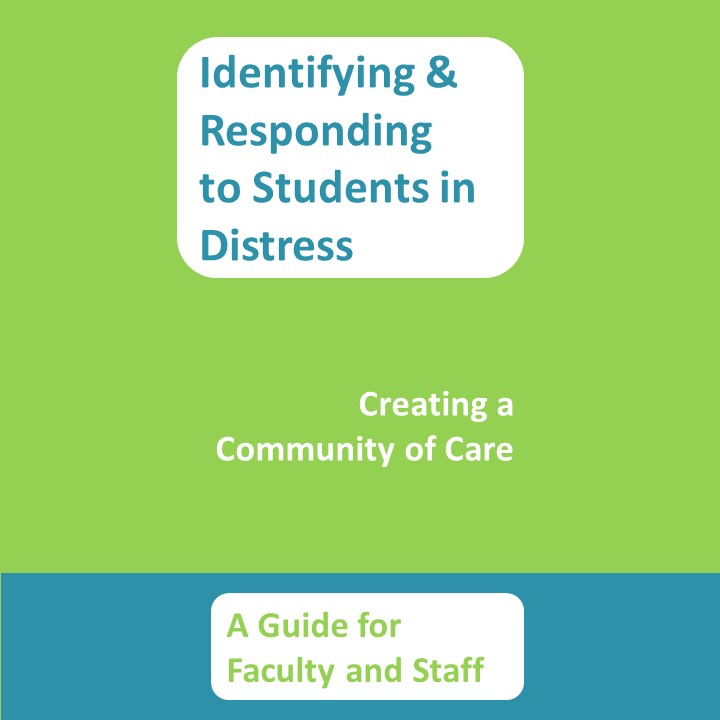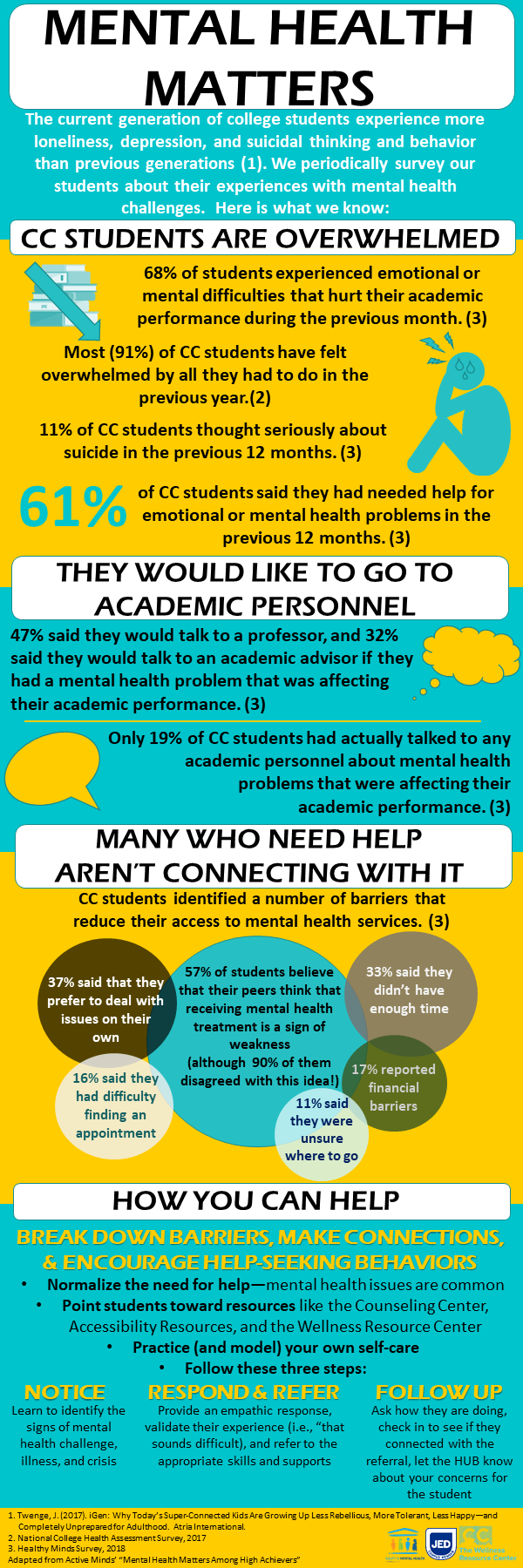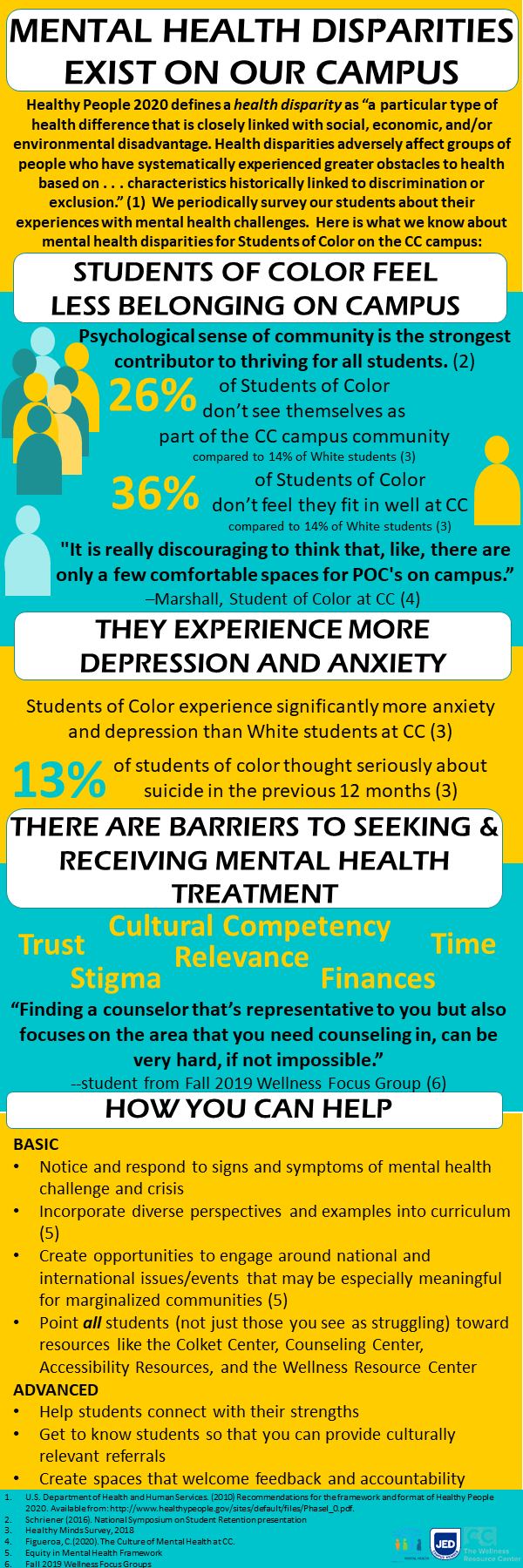For Faculty and Staff
When we are confronted by situations like the Coronavirus pandemic which hold a great deal of uncertainty, it's only natural that we experience some anxiety. There are a number of time-tested strategies for managing anxiety that can be very helpful in Managing Coronavirus Anxiety, and there are also resources specific to supporting students of color through this crisis. Framing the experience of moving classes to an on-line digital format as a learning opportunity for everyone involved--something that will be imperfect--might also offer opportunities for faculty to help students Challenge their Perfectionism. There are also a number of strategies that resilient people and organizations employ that would be helpful for faculty to model in their classrooms (virtual or not): Resilient People and Organizations Take These Steps:
- Have a strong sense of purpose and meaning for why they do what they do
- Work to reframe stress as:
- A challenge instead of a threat
- A motivator
- Manageable instead of overwhelming
- Focus on possibilities instead of problems
- Develop a sense of (personal) control
- Maintain a positive outlook
- Use sound problem-solving skills
- Have a good sense of humor
Normalizing challenge and even struggle by pointing students to resources before problems arise is a great strategy that empowers students to utilize resources and to see themselves as agents of change in their lives. This can be done on your syllabus and in-person on the first day of class. If your students are looking for resources, you can direct them to some of our on-line resources, or suggest that they reach out for consultations with staff from the Wellness Resource Center, Chaplain's Office,Counseling Center, Advising Hub, Butler Center, or Career Center.
In general, concerns about mental health on college campuses have dramatically increased over the last decade. Here at CC, we are doing a variety of things to promote mental health and respond to mental health needs. Because of your close contact and relationships with students, faculty are integral to this work. These infographics share some key mental health metrics and proven strategies for helping to connect students to resources.
Making good referrals is a key part of a compassionate, empathic response to students. First, familiarize yourself with campus resources available through our Stepped Care Model, then follow some simple Tips for Making Good Referrals. You can also find some quick tips for Identifying and Responding to Students in Distress in our Guide for Faculty and Staff:
Co-Curricular Collaboration and Support
We are happy to continue these kinds of collaborations and supports in the digital/remote environment as we navigate COVID-19!
Content-based collaborations: The Wellness Resource Center serves as the campus leader for prevention and health promotion work through leadership, coordination, and integration of campus health and wellness initiatives. Our public health approach to wellness is holistic and multi-dimensional, emphasizing that individual wellness is embedded within an inclusive, healthy community. We therefore incorporate an understanding of systems of oppression, equity, and inclusion into all of our work. The content of our work intersects with content taught in many classes across academic divisions. So, we welcome opportunities to collaborate with faculty and to support learning inside the classroom. Examples of this kind of collaboration include:
- Facilitation of a teaching and learning discussion about trauma, trauma-informed care, and self-care (this has been done in sociology courses with border-based field work, courses focused on the intersection of dance, socio-politics and global histories, and courses focused on narrative as a source of healing and social change)
- Workshop on understanding how to use personal narrative for 2 different purposes: personal healing vs. creating social change
- Facilitation/co-facilitation of discussions about sexual violence, healthy sexual engagement, mental health, and substance abuse
- Facilitation/co-facilitation of teaching and learning discussions about public health and prevention best practices
- Collaboration on bringing speakers to campus
Student Development and Prevention Programming Collaborations: The Wellness Resource Center's regularly scheduled programs and workshops are designed to achieve our health promotion and prevention goals and to support student development. Supporting students in these ways helps them be healthy engaged students. We hope that faculty will encourage their students to attend these programs (i.e., our Journaling Series, stress management workshops, Science of Substances Series, Good Sex Series, BADASS Active Bystander Intervention trainings, Dating After Abuse, etc.), and we are always excited to come into classrooms to facilitate these kinds of personal development and prevention programs; examples of programs facilitated within the classroom setting include:
- Facilitation of discussions about consent, campus culture, mental health, substance abuse and addiction, active bystander intervention, campus policies and resources
- Workshops on time-management, stress management, or self-care
- Workshops on identifying personal values and exploring how to bring those to life through the college experience and life, generally.






